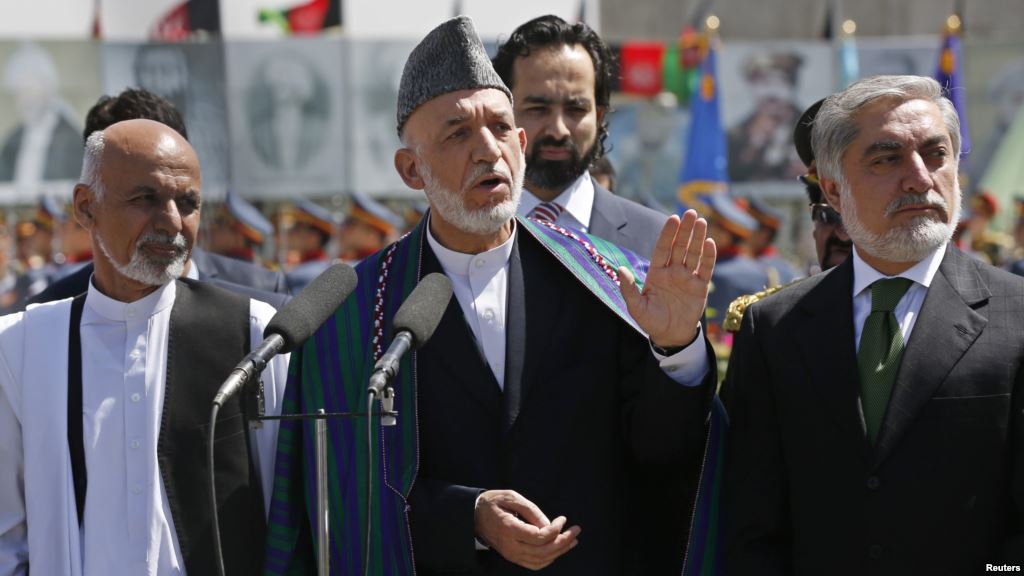Karzai Frowns at New Afghanistan-Pakistan Cooperation Under Ghani
Ghani, Karzai and Abdullah

NEW DELHI: Whilst the world breathes a sigh of relief as Afghanistan and Pakistan work on mending ties, with the latter convincing the Taliban to begin a dialogue process with the Afghan government, not everyone is entirely pleased.
In an interview with The Guardian, former Afghan President Hamid Karzai -- under whose leadership relations with Pakistan had dipped to a historic low -- said that the country’s historic struggles against British imperialism and Soviet invasion will have been in vain if it succumbs to pressure from Pakistan.
“We want a friendly relationship but not to be under Pakistan’s thumb,” Karzai said.
The former leader rejected any suggestion that he was at the centre of what has been described as a “pocket of opposition” to current Afghan President, Ashraf Ghani. “Yes, I have differences, but I will not say anything,” Karzai said. “I will keep mum, giving advice to President Ghani in private. I absolutely support this government.”
Nevertheless, in the interview, Karzai openly criticised some of Ghani’s key policy initiatives, including the decision last month to send six army cadets to Pakistan for officer training. “We should not send troops for training in any of the neighbouring countries, particularly when they are sending us suicide bombers in return,” Karzai said -- referring to a long held contention of Afghanistan, namely, that neighbouring Pakistan is supporting is nurturing militants who are in turn active within Afghan borders.
This view was echoed by Karzai’s associates who sat in on the interview. Rangin Dadfar Spanta, a former foreign minister and national security adviser said that the policy amounts to the humiliating “appeasement” of a hostile power who would never change its ways. Spanta seems to believe that Afghanistan would be better off reaching out to India, considered the region’s superpower, who is angrily watching the troubled country reach out to Pakistan instead. In a sign of Delhi’s displeasure, work has already stalled on some key Indian-backed development projects in Afghanistan, Spanta claimed.
There was also criticism on a series of meetings between Afghan and Pakistani officials, including a meeting between Ghani and Rizwan Akhtar, Pakistan’s spy chief, without the presence of his opposite number, Afghanistan’s intelligence chief, Rahmatullah Nabil.
What is important to note here is that Karzai does not represent an isolated view. An important figure within Afghanistan, Karzai echoes a distrust that runs deep with the Afghan people. Ghani, therefore, will inevitably -- sooner rather than later -- begin to face pressure in showing that his policy is capable of bearing fruit.
The pressure will increase if the Taliban continue with their attacks, which thus far, have shown no sign of letting up. In the interview, Omar Daudzai, one of the most influential officials of the Karzai era who served as chief of staff and interior minister, predicts, “There could be a bloody summer, there will be fighting and there will be disappointments on the dialogue table from time to time.” Daudzai, a former ambassador to Islamabad, added that whilst he thought Ghani’s attempts to woo Pakistan were “courageous,” they would ultimately fail to change the country’s behaviour. “He has taken controversial steps that his predecessor didn’t take, and now we have to wait to see whether the Pakistani side is sincere or not,” he said. “But I am far more sceptical than I ever was before about Pakistan’s sincerity.”
Meanwhile, the rest of the world is more optimistic. For the first time since the US invaded Afghanistan and toppled the Taliban government 13 years ago, has the group agreed to hold talks with the government. The Taliban has thus far refused to open a dialogue process, terming the government illegitimate and stepping up attacks on officials and security forces. This stance has claimed thousands of lives, rendering 2014, the worst year yet in terms of civilian casualties. Since 2009 -- when the UN began tracking casualties -- the armed conflict in Afghanistan has caused 47,745 civilian casualties with 17,774 Afghan civilians killed and 29,971 injured.
Pakistan’s support has been the crucial factor leading to this development, by pushing the Taliban leadership to agree to talks with the Afghan government. A report in The Express Tribune quoted an unnamed former top commander of the group saying, “Taliban officials, who had been involved in talks with the Pakistanis and the Chinese, and had sought time for consultations with the senior leaders, have received a green signal from the leadership,” adding that “Pakistani officials had advised Taliban leaders to sit face-to-face with the Afghan government and put their demands to find out a political solution to the problem.”
The same report quoted another unnamed Taliban source confirming the report and adding that “a small delegation will be visiting Pakistan in days for consultations” to be able to take the discussion with the Afghan government forward.



